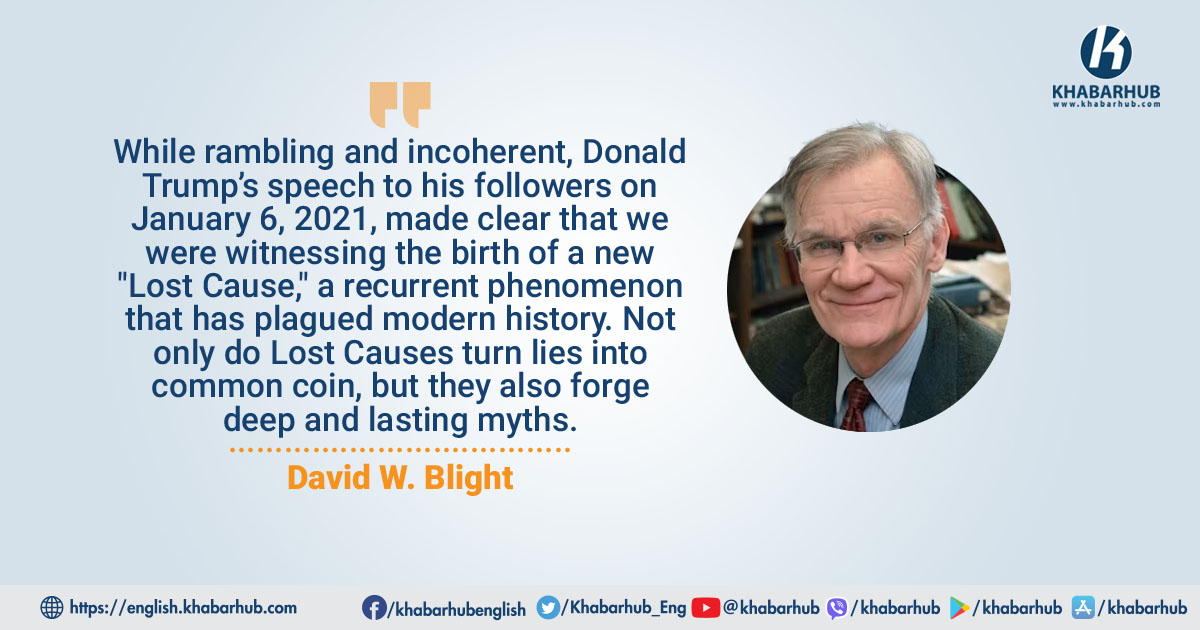On January 6, 2021, in Washington, DC, US President Donald Trump, the loser of the 2020 election, famously addressed a gathering of followers who then joined the mob that attacked the US Capitol.
While rambling and incoherent, Trump’s speech nonetheless made a few things clear: leftists had conspired to steal the election by fraud, and the mobs summoned to Washington on his behalf would need to “stand strong.”
The implication was that violence might be necessary, because “you’ll never take back your country with weakness.”
Trump then made Vice President Mike Pence the target of collective scorn for refusing to send the Electoral College process back to the states.
If “weak Republicans” would not step up and participate in overturning the results, Trump vowed, “we will … never ever forget.”
For the next 4-5 hours, in the most recorded event in American history, the world watched as a new “Lost Cause” was born in violence and spectacular lies.
There have been numerous Lost Causes in modern history, usually following defeats in war, where the vanquished glorify their loss as a source of pride and shared animosity toward the victors.
Some are also staunch believers in conspiracy theories about “fraud” allegedly committed in the 2020 election, as well as other dark notions of leftist machinations in American universities, on school boards, and in the Democratic Party.
Three big Lost Causes have plagued world and American history. Following their bloody defeat in the Franco-Prussian War of 1870-71, the French exhibited an intergenerational cultural need to avenge the loss.
Then, following Germany’s defeat in World War I, the Nazis gained traction by blaming Jews and leftists, who were depicted as “poisons” in the blood of the body politic.
And then, of course, there was the American South after the Civil War, when the narrative of the Confederate Lost Cause yielded a potent brew of twisted history and white supremacist ideology.
Lost Cause narratives sometimes have been powerful enough to build or destroy political regimes, shape national and ethnic identities, and fill landscapes with monuments.
They work primarily as powerful new founding myths, always advancing a politics of grievance that turns into retribution, and sometimes victory.
Immediately after the military surrender in 1865, forms of the Confederate Lost Cause took root in a Southern society marked by physical destruction, the psychological trauma of defeat, resistance to the victors’ policy of Reconstruction, racial violence, and – with time – carefully constructed sentimentalism.
Some are also staunch believers in conspiracy theories about “fraud” allegedly committed in the 2020 election, as well as other dark notions of leftist machinations in American universities, on school boards, and in the Democratic Party.
Some are also staunch believers in conspiracy theories about “fraud” allegedly committed in the 2020 election, as well as other dark notions of leftist machinations in American universities, on school boards, and in the Democratic Party.
Southern white women allegedly supported the cause to the bitter end and helped preserve the “truthful” memory; the Confederacy’s enslaved black population supposedly remained loyal to their owners; and, finally, the Confederates had never really fought for slavery, but rather for “home,” national sovereignty, and states’ rights.
To be sustained as public propaganda, Lost Causes need a pure narrative with clearly identified villains and heroes.
Sometimes, they are havens of sick souls; other times, they are the means to power for a disciplined political movement.
Trump’s Lost Cause, now newly virulent as he campaigns for a second term despite multiple indictments, draws on a menu of grievances among the disaffected, energizing those who believe that a “diversity”-obsessed multicultural America has veered out of control, especially in relation to immigration at the Mexican border.
The Trump Lost Cause is thus a platform, one that the Republican Party has adopted to convert these stories, lies, and entertainments into votes. Win or lose, it will not die.
Some are also staunch believers in conspiracy theories about “fraud” allegedly committed in the 2020 election, as well as other dark notions of leftist machinations in American universities, on school boards, and in the Democratic Party.
Unlike the Confederate Lost Cause, the Trump version is a kind of gangster cult, full of loyalty rituals to a single man and his plans to fashion an authoritarian US government that will use executive power to achieve his followers’ preferences.
Trump’s Lost Cause also has its martyrs, including the hundreds of convicted insurrectionists – known in the movement, and by Republican politicians such as Elise Stefanik, as “hostages” –now in prison.
Above all, it peddles a model of politics and society according to which facts and evidence are irrelevant.
At Trump rallies, constitutionalism is for losers, history is little more than a useful weapon, and American civics is mere entertainment, deployed for attendees eager to indulge their hatred of liberalism, representative democracy, and – in many cases – of non-white America.
Lost Causes can turn lies into common coin and forge deep and lasting myths. We are a long way from knowing how much staying power the Trumpian Lost Cause will have, regardless of whether he survives his criminal charges and the election campaign.
The Trump Lost Cause is thus a platform, one that the Republican Party has adopted to convert these stories, lies, and entertainments into votes. Win or lose, it will not die.
Many writers are trying to help us navigate these fraught times. In Tim O’Brien’s new novel, America Fantastica, a ragtag collection of misfits and down-and-outs embark on a series of lawless escapades, including bank robberies and various other forms of larceny.
The reader gets a glimpse of a society where lying is utterly ubiquitous, and where a “mythomania” has swept the country, led by a “monster” of a “POTUS.”
At least in the Confederate Lost Cause, white Southerners truly had to endure colossal mourning: nearly 300,000 people lay in graves across their landscape, and much of their society lay in ruins.
Trumpian mourning seems rooted in social-media-driven nostalgia for an ideal past that almost no one experienced.
The movement’s supporters long for a vanished racial order, for a world of secure social identities preserved from unknown but hated elites, and for communities that have not been drained of cohesion by the internet, the pandemic, and economic displacement.
They need their story to be great again.
Lost Causes can turn lies into common coin and forge deep and lasting myths. We are a long way from knowing how much staying power the Trumpian Lost Cause will have, regardless of whether he survives his criminal charges and the election campaign.
What we do know is that we have already witnessed its formative years.
(David W. Blight is Sterling Professor of History at Yale University)
Copyright: Project Syndicate









Comment